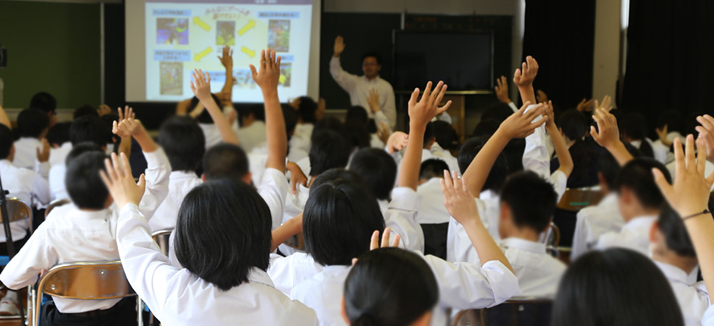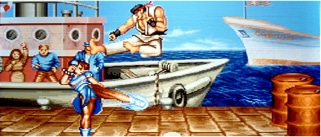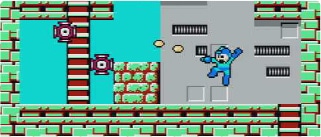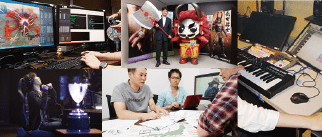10 Years of Supporting Education at CAPCOM
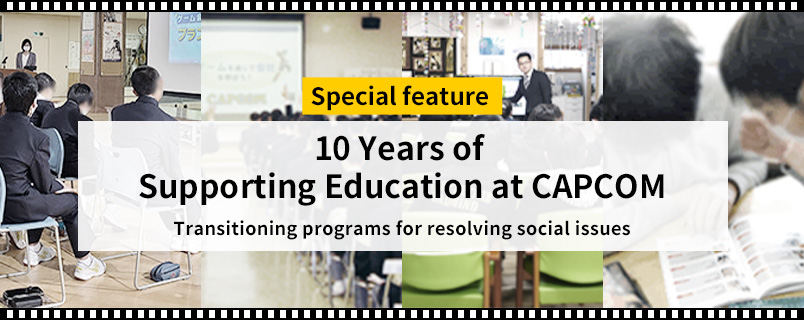
Introduction
Beginning with the release of the Family Computer in 1983, the popularization of home video game consoles has drastically changed the lifestyles of young people.
Numerous households own game consoles presently, and there is no question that playing games is an indispensable aspect of the growth and development of children; which is not to say the effects–including an increase in time spent playing alone or excessive concentration (being in “the zone”)— are entirely positive. Supposing if, for argument’s sake, home video games did encourage these habits and had a negative impact on healthy growth, development and communication skills; as developers and providers of game software, we must assert that creating such effects is absolutely not our purpose or intent.
Current educational institutions — including elementary, middle, and high schools—are actively teaching career education to develop a professional mindset in young people.
Having received requests from numerous schools and local governments, and as a responsible corporate citizen and member of the video game industry, we also provide educational programs that include company visits as well as guest lectures from employees.
These programs cover career development, which introduces life at a game company and the diversity, fun, challenges and importance found in our work, as well as game literacy education, which outlines the appropriate way to interact with games in daily life.
We hope that through these programs young people will acquire a better understanding of games and be equipped with the knowledge and ability to pursue a healthier relationship with them.
Why we began our Educational Support Programs
| Fiscal Year | Company visit | Guest lecture |
|---|---|---|
| 2004 | 1 | – |
| 2005 | 11 | – |
| 2006 | 33 | – |
| 2007 | 38 | 2 |
| 2008 | 24 | 1 |
| 2009 | 17 | 1 |
| 2010 | 25 | 4 |
| 2011 | 28 | 7 |
| 2012 | 33 | 9 |
| 2013 | 39 | 24 |
| 2014 | 26 | 25 |
The video game sub-culture is comparatively new and lacks extensive academic research. Because of this, rather than being discussed for their educational aspects, a debate over the negative effects of games due to portrayals of violence has generally taken root.
Additionally, interest in games from a developmental health perspective on the part of local governments is high, and certain games have been labeled as being harmful to the upbringing of young people.
Our company in particular has produced games containing strong action elements and intense imagery, thus we feel there is a need to actively engage the issue to relieve public concern over the influence games have on child development.
In contrast to this, the game creator profession is a popular choice among children as a future career, and schools that incorporate portable game devices and tablets into classrooms are becoming more common in recent years.
Being a game maker, it is our social responsibility to promote the understanding of games ; thus, in 2004 we decided to launch our educational programs for elementary and middle school students.
Company Visits
Beginning in January of 2005 we started our company visit program, under which interested elementary and middle schools visited our Osaka headquarters on field trips or during general school hours.
At the time the program was titled “The Game Creation Process”, and was rolled out as a career education initiative that conveyed the importance of communication—since a single game title sees multiple disciplines such as planner, designer, sound creator and programmer all cooperating—as well as the need for knowledge in mathematics and science in game development.
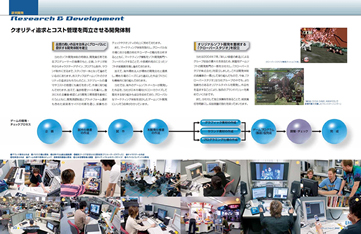
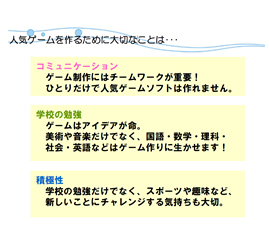
Comments from students included, “I learned that just liking games isn’t enough to become a creator”, and “I want to use this experience to become a game developer”.
Teachers also submitted positive remarks: “Lately they say it’s difficult for kids to dream of the future, but this was a good chance for them to consider realistic career opportunities”.
From this we felt the need to continue, and in 2005 we opened up our Tokyo office to visits as well; we received 11 visits total for that year.
Guest Lectures
Having seen the value in company visits, we then started performing guest lectures at schools as of June 2007.
However, we quickly discovered that engaging a small group of student s on a company visit is comparatively easier than maintaining the attention of a large group of students during a guest lecture as the number of students per lecturer is so much greater.
To remedy this we gathered feedback on our activities up until that point, and in collaboration with an education consultant, created a new program in 2009.
This new program, which is still in use today, totals 90 minutes in length and in addition to the existing career development aspects also includes content on game literacy—a topic we had intended to include from the program’s inception.
Beyond merely having a lecturer speak, the program incorporates media designed to keep participants engaged: In the career development portion we added footage from the normally-off limits development floors, while the game literacy section features videos of experts discussing topics such as “why we get engrossed in games”, and “setting limits on play time”, as well as “what to be careful of when playing”.
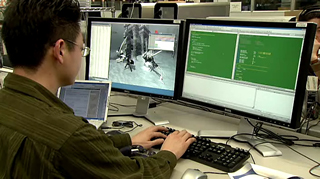
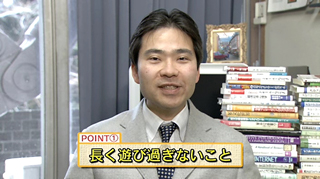
Although our guest lectures were created for elementary and middle schools, we also receive requests from other organizations.
For example, because CAPCOM’s motto of “create and share games bursting with originality with the world” was coincident with the Naniwa Juvenile Detention Center of Osaka’s motto of “nurturing the strength to thrive and building capable individuals: A world-class Naniwa” they requested a lecture, which we held on March 9, 2010; in January of 2014 an NPO supporting relief-efforts for the disaster-stricken Fukushima approached us because they wanted a lecture that would serve as part of a reconstruction support project to provide education and stress relief for the children there.
We held this guest lecture on game literacy at a temporary housing unit in Fukushima.
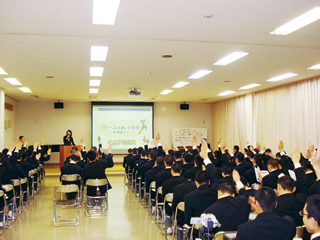
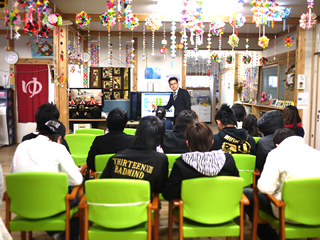
Publishing The Secret of Video Games
Due to the popularity of our company visits and guest lectures we published an educational graphic novel called The Secret of Video Games in cooperation with GAKKEN HOLDINGS CO.,LTD. ( formerly Gakken Co., Ltd) on May 1, 2007.
Designed for organizations unable to visit CAPCOM, one aim of the book was to collect the numerous questions we receive from young people—and our answers to them—into a single volume; we have donated copies to approximately 24,000 elementary schools and 2,700 public libraries throughout the country.
Although published as a child-orientated comic, our motivation for offering the book to libraries was because the book was also designed with parents in mind.
The main story was for kids and centered on appropriate play habits and how games are made; however, information in the margins and columns was included to inform parents on how children can best interact with games, recent debates about the effects of games on the brain, as well as how—beyond mere toys—games are one of Japan’s world-leading industries and an important cultural asset.
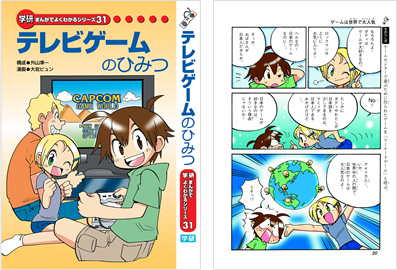
We wanted to create a book that went beyond CAPCOM, and attempted to include information on the overall game industry; however, the amount of license applications we needed substantially increased, and in many cases the identity of copyright owners for past properties was not clear—which took a great deal of time to investigate.
We are nevertheless deeply grateful to the companies that granted their acknowledgement and consent to the publication of the book.
The book proved especially popular at schools, and we even received direct requests over the phone from a school principal asking for new copies because the ones in the library were all thoroughly worn out.
As the book was so well received all copies were distributed and it is no longer available on the CAPCOM IR homepage.
New Programs
We received a variety of feedback from educators following the creation of our program in 2009 and based on this we created two new programs specializing in career education—bringing the total number of programs up to three.
One of these programs was created in 2011 to accompany the new guidelines for teaching; it also reduced the size of the game literacy portion from the 2009 program while expanding upon the career education elements.
In addition to introducing job functions outside of what is usually thought of as development—such as localization, which translates and prepares games for overseas, or sales, which carries out the selling of games, and finance, which manages the company’s money—we strengthened the content of our career education portion by making time for students to think and present on:
1) what job they want to do,
2) why they chose that job, and
3) what skills they think are necessary for that job.
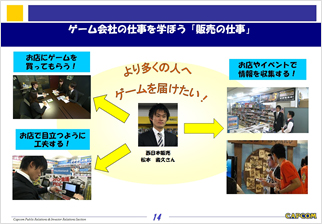
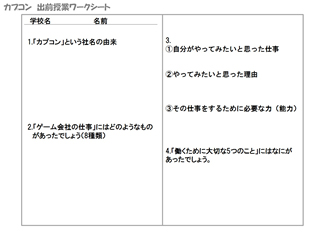
The other new program is called CAPCOM: Work × Mathematics. In 2012, the Organization for Economic Cooperation and Development (OECD) released a Programme for International Student Assessment (PISA) study which exposed that Japan’s mathematical literacy— defined by the National Institute for Educational Policy Research as “the ability to formulize and apply mathematical knowledge in various contexts”—dropped from first place in 2000 to tenth place in 2006.
This study was conducted on approximately 510,000 fifteen-year-olds across 65 countries.
Although Japan’s rank bounced back to seventh in 2012, mathematical literacy still lagged behind other subjects (such as reading comprehension and scientific literacy) which sparked fears that young people were losing their interest in mathematics.
To combat this issue, starting in April 2013 we began this new program that incorporated mathematics into career development.
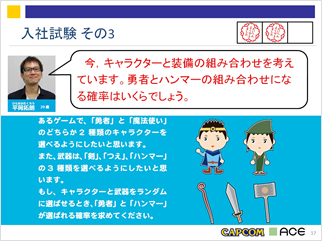
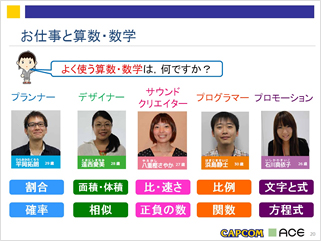
The program not only contains an introduction to what kind of jobs we do, but al so shows how mathematical concepts like ratios, equations and combinations are used in a real work environment, giving students a chance to see how what they learn in the classroom is connected to future work.
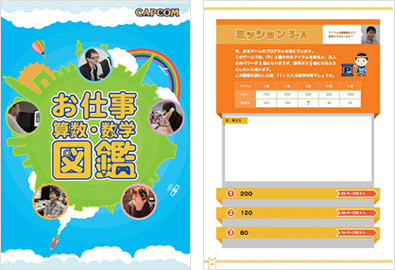
Additionally, by distributing the supplementary The Encyclopedia of Work and Mathematics, we could give young people a chance to read through interviews with game developers and study other material that did not fit into the confines of the classroom at home. What’s more, because the book itself was fashioned into a game where the reader must correctly answer questions in order to proceed, children could have fun while they learn.
The program received a lot of positive feedback, with students saying that “this made me want to study math more”, and teachers and parents beaming that the program “showed students that what is learned in school is needed even after you set out into the world”.
Conclusion
Launched in 2005, CAPCOM’s career education support program is now in its eleventh year.
Our guest lectures, which began at a pace of one school per year and centered on the Kanto and Kansai areas, have now expanded with requests from more than 20 organizations nation-wide coming in annually.
With this kind of experience under our belt, we are aware of what is expected of us now more than ever.
Moving forward, we look to realize the following initiatives.
1. Launch an independent program for Game Literacy Education.
2. Create a forum where not only children, but also parents and educators can exchange ideas and opinions.
With the spread of smartphones and tablet devices and advances in internet technologies, the environment of the game industry has drastically changed in the 10 years since we began our educational programs— meaning that the appeal of games and the ways we interact with them have also evolved.
We are committed to meeting the needs of educators by working closely with university experts and gathering feedback from schools to further refine our programs and continue communicating the importance of work and proper ways of interacting with entertainment via the fun of games.
Source: Computer Entertainment Supplier’s Association “2015 CESA Games White Paper”
